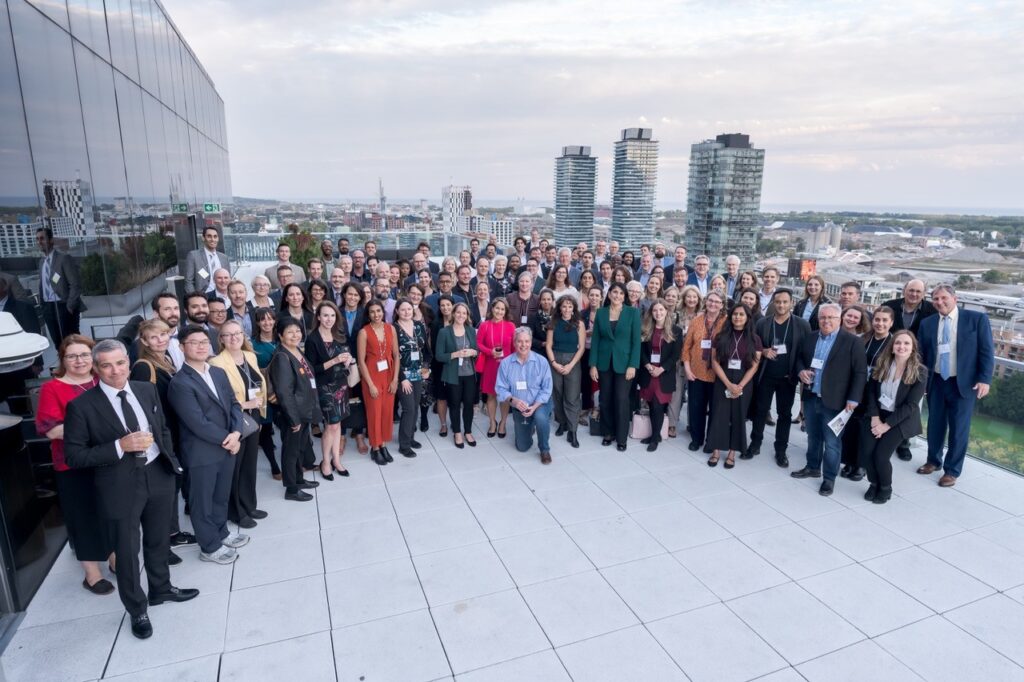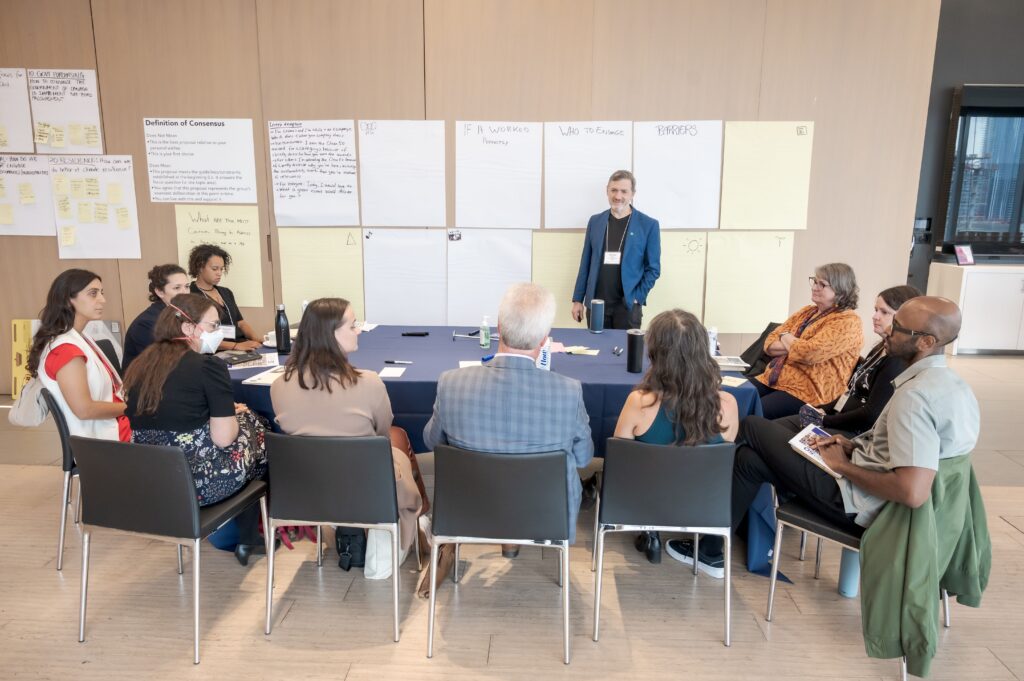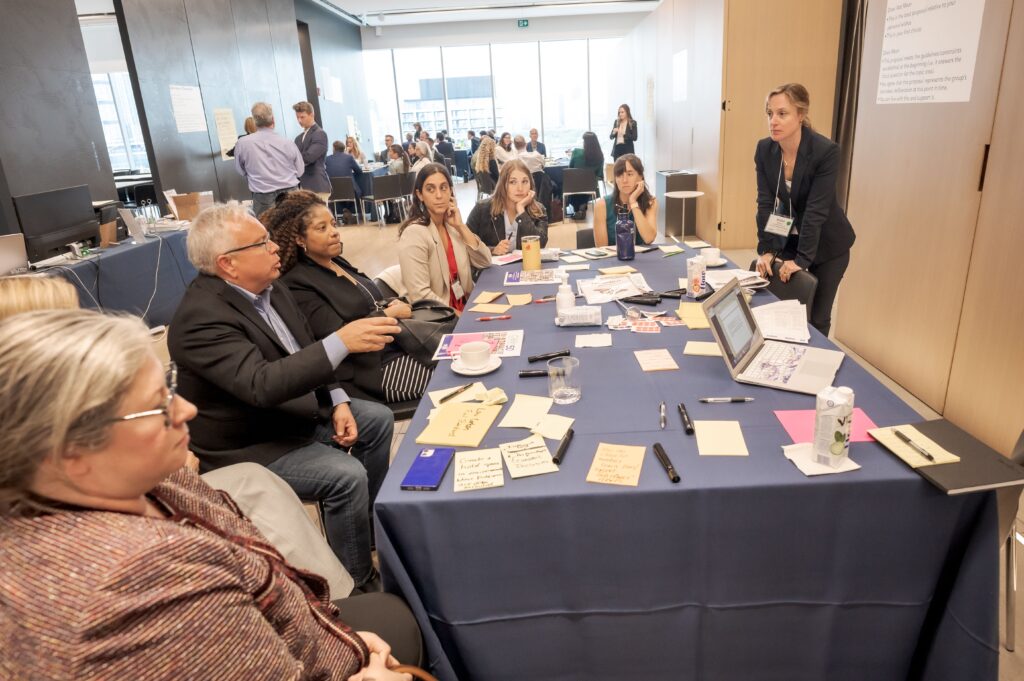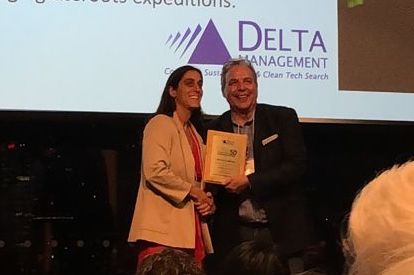The Incredible Experience of an Environmental Non-Profit at the Clean50 Summit
Niki Cesta, co-founder of The Wasteland Plan Foundation, shares transformative highlights and key, measurable results from being recognized as a 2023 Emerging Leader and attending the Clean50 Summit in October 2022.
How often do the brightest minds in sustainability gather in one space to accelerate a cleaner, healthier, profitable, innovation-based, low-carbon economy? The answer is, not often enough.
On October 6th, 2022 I had the absolute honor and privilege to gather with the brightest minds and learn amongst Canada’s top sustainability leaders; the incredible incoming 2023 Cohort of Clean50 Honourees! Before I walk you through the day and spotlight the meticulously tailored workshops and some conversational highlights, I would like to emphasize two key, measurable outcomes that resulted from attending, and receiving an Emerging Leader award at the Clean50 Summit.

60+ meaningful connections made on LinkedIn whilst networking and immediately following the closure of the Clean50 summit.
If you’re an entrepreneur of any sort, you might be familiar with the ‘hidden cost’ of a contact list, or the time and action that is required to forge and grow a meaningful network that truly supports your business. The average cost starts at thousands of dollars; otherwise known as invaluable when you’re building a grassroots, non-profit business like myself. Now, if you’re building a larger, complex corporate brand, this cost might seem quite small.
Allow me to remind you that we are living in a post-covid world where the virtual connection just doesn’t quite make the same impact anymore. Today, more than ever, a trusted, long-lasting connection starts with a forthright, in-person discussion and some quality eye contact. I can safely say there were numerous occasions at the Clean50 Summit when I overheard some ‘big players’ utter ‘it’s about time we sat at a table together.’
The second key, measurable result: visibility from being recognized as an Emerging Leader. Recognition is something that doesn’t happen regularly when you’re busy building a business, especially within the first 5 years of its conception. According to a research inquiry performed by a well-known startup company, “a company is identified as an ‘overnight success’ when it’s been discovered after year four, but typically has been around for between 7-10 years.” With our pressing climate alarm, 7-10 years is far too long to be waiting for recognition and visibility to accelerate environmental change.
Additionally, the reality of present-day visibility is regretfully embedded in the number of ‘likes’ or ‘comments’ you receive on a social channel. I can reassure you, there is a lot more incredible work happening offline, and independent of ‘likes.’ This work simply requires a platform, and that platform is the Clean50 Summit.
So here we are. It’s 9am on October 6th and we find ourselves exiting the elevator on the 17th floor that is the bright, big-windowed room of the Globe and Mail event space. We enter the room to find designated workshop stations with facilitators prompting tailored questions that are assigned to each one of us based on relevance to our work, and prospect of partnerships. At the first of three workshop stations, I was assigned to discuss “How we best use nature-based solutions to drive climate solutions.” To my left, Catherine Grenier, President of the historic Nature Conservancy of Canada, and to my right, Jack Bruner, Co-Founder of the young startup, Carbon Neutral Club. The spectrum of voices at the table led to a robust discussion with a solution-driven result.

A Coles Notes synopsis of our discovery: if nature-based solutions ‘worked perfectly’ there would be “funding for development and innovation led by people in nature, public awareness raised through concrete and transparent data-sharing, preceded by early childhood education and climate literacy”. A mouthful indeed but a good argument that drove consensus around the table. Interestingly, after each discussion I reflected on what had actually made for a good argument. I discovered that the good arguments consisted of initial disagreements with the capacity for us all to be vulnerable enough to adopt a new lens. This was one of many discoveries I made on this day.
“There was a vulnerability and truth present that I hadn’t experienced in this setting before. Amongst difficult conversations there was optimism, cross-collaboration, support and inclusivity felt.”
From my reflective LinkedIn post, post-summit
In the moments between each of the three tailored workshop discussions, there was the opportunity to pause for a brief refreshment and digest the conversation; an important action that I took to neutralize my palette before stepping into a new discussion with new leaders. In anticipation for what was next, I took a few deep breaths as I prepared my tea in the reusable Yeti I bring along with me everywhere. I approached the table with excitement as Gavin’s guiding voice reverberated over the mic in the background, prompting us to take a seat at our next station immediately. The second question posed, “What are the most critical things to address to help us achieve 75% circular economy?”
“If it ‘worked perfectly,’ a 75% circular economy would be reached by listening to First Nations to stabilize biodiversity and induce a regeneration mindset, whilst developing baselines, targets and metrics that inform process re-engineering to enable solutions to move from theory to practice. The divisions between sectors would be eliminated as we collectively rethink the production, supply and use of products and materials. Lastly, it is critical that throughout each of the mindset shifts, sustainable behaviours become valued and rewarded.”
A summary of the second discussion
As I observed, learned, and listened from the experts around me, I couldn’t help but notice that I was the only one at the table who was sipping from a reusable mug. I raised my hand with a philosophical thought that sincerely reflected how I was feeling in this moment of awareness; I said, “if it worked perfectly, every single one of us at this table and on this planet would take small, conscious, and consistent actions each day to lead by example and create the global shifts that we’d like to witness. From the bottom up, we would individually create the change.” Robert Swan wrote it best when he stated that “the greatest threat to our planet is the belief that someone else will save it.” Let us pause to consider how we can each step up to achieve a more circular economy.
There I was again standing at the refreshment counter, digesting topics from our second tailored workshop and cleansing the palette before shifting into the next. Having been the one to highlight and prompt discussion around the critical role of First Nations in stabilizing biodiversity to reach 75% circular economy, I was feeling advocative and called to share further at my next and final workshop of the day; “Reconciliation – How can Clean50 members be better allies to First Nations/First Peoples?” To my left, Jessica Nixon, Director of Economic Development, Cowessess First Nation and to my right, Dr. Ingrid Waldron, Director of The Environmental Noxiousness, Racial Inequities and Community Health Project.
The moment we finished our final round-table introductions, I sombrely recognized that this was in fact my time to listen deeply. In full transparency, this workshop was communicatively challenging. At first, we collectively didn’t quite understand the question at hand. Half of us believed that we should address ways in which the Clean50 summit could become a greater platform for First Nations voices, and the other half believed that we should specifically address our individual responsibility to become better allies to First Nations/First people as members of Clean50, outside of the summit.

As we danced around the question trying to frame our approach, we silently came to a consensus. It didn’t matter what the exact question was, what mattered was that we began to all recognize that “each and every one of us must participate in truth-telling. We must ‘do the work’ and make it our individual responsibility to educate ourselves on Indigenous history and practices.” Experts around this table shed a lot of light on what reconciling a deep history of irreversible damage looks like. After digesting the discussions at this powerful workshop, I best understood that it starts with deep listening.
“Amplifying Indigenous voices, and welcoming peoples to have a seat at the table is primarily the act of stopping to listen first in order to deeply understand what will serve communities best, rather than to just respond with what we think will. We could also each step up to offer Indigenous youth mentorship opportunities, and create space for meaningful, truthful connection. This is allyship. This is how you, us, Clean50, can be a better ally to First Peoples.”
My biggest takeaway from the third discussion
Back to the refreshment counter I went. Conversations continued and it felt as though neuron circuits were being fired up and fused throughout the ‘big room’ that was now feeling quite small and familiar. We took a seat and embraced the delicious dinner plates that reached our tables. Lessons continued to flow in as incredible projects and leaders took the stage to receive their recognition. Over dinner, my partner Savannah and I were fortunate enough to raise a toast with our mothers by our side. As an LGBTQ2+ couple building an environmental non-profit in year four of its conception, we didn’t imagine that the pure devotion to our work and eco-community would break down some perceived barriers and propel us into a space like this, this early on, with our mothers by our sides.
The Wasteland Plan Foundation (TWP) was established in August 2018 with the mission to build conservation-centric communities that respect, explore, and restore our natural world. As a non-profit with a smaller budget, summits and networking events haven’t always been made accessible to us. It is with thanks to Gavin, who transformed this opportunity into an accessible one for my partner Savannah by offering her a ticket to attend in exchange for volunteer hours.

On the topic of transformation, the buzz in the room was felt as we continued on having vibrant dinner discussions with some influential and transformative sustainability changemakers! One empowering leader at our table stands out to me, Elizabeth (King) Shirt, President at GLOBE Series; a certified B Corp organization that convenes events which connect and inspire innovators and leaders to accelerate in a net-zero, equitable economy. Over dinner, Elizabeth shared her insight and expertise with us. She offered incredible, personalized, experience-based suggestions for hurdling over some of our current non-profit roadblocks, and provided insight into fellowship opportunities, and upcoming sustainability summits. Our dinner discussion with Elizabeth generated some exciting and immediate steps for us at TWP. We’ve been drawing up applications, reaching out to related groups, and penciling in some 2023 sustainability summits we aim on attending. What a fantastic and pivotal evening for us!
With endless thanks, I am grateful to have witnessed top sustainability projects and leaders be recognized on our precious and traditional Indigenous lands. Congratulations to every single person in the room for accelerating Canadian sustainability across all sectors. At TWP, we highlight that small consistent actions lead to big changes if we continue to move with intention. Let’s do just that.














